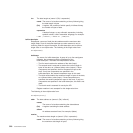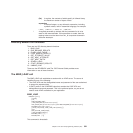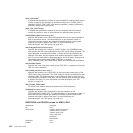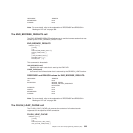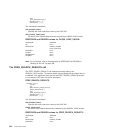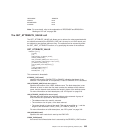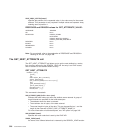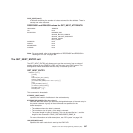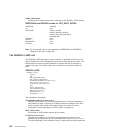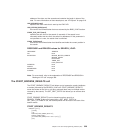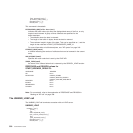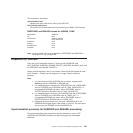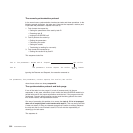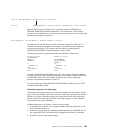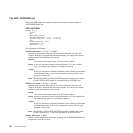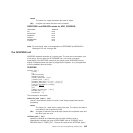SEARCH_TOKEN(name4)
the name of the fullword token that is returned by the SEARCH_LDAP function.
RESPONSE and REASON values for GET_NEXT_ENTRY:
RESPONSE REASON
OK None
EXCEPTION INVALID_TOKEN
INVALID_BUFFER_LENGTH
INVALID_CALLING_SEQUENCE
BROWSE_END
DISASTER None
INVALID None
KERNERROR None
PURGED None
Note: For more detail, refer to the explanation of RESPONSE and REASON in
“Making an XPI call” on page 308.
The SEARCH_LDAP call
The SEARCH_LDAP call sends a search request to a specified LDAP server. The
search specifies an LDAP distinguished name, that is the target of the search. The
search returns a series of results (attributes or entries) that can be browsed or
selected. An entry is an LDAP record, and an attribute is one element within an
entry.
SEARCH_LDAP
DFHDDAPX [CALL],
[CLEAR],
[IN,
FUNCTION(SEARCH_LDAP),
LDAP_SESSION_TOKEN(name4),
DISTINGUISHED_NAME(block-descriptor),
[FILTER(block-descriptor),]
[SEARCH_TIME_LIMIT(name4),]]
[OUT,
SEARCH_TOKEN(name4),
[LDAP_RESPONSE(name4),]
[ENTRY_COUNT(name4),]
RESPONSE(name1 | *),
REASON(name1 | *)]
This command is threadsafe.
DISTINGUISHED_NAME(block-descriptor)
specifies the location of the LDAP distinguished name. The block-descriptor is
two fullwords of data, in which the first word contains the address of the data,
and the second word contains the length in bytes of the data. For more
information on block-descriptors, see “XPI syntax” on page 319.
ENTRY_COUNT(name4)
the number of LDAP entries returned by the search.
FILTER(block-descriptor)
specifies the location of an LDAP filter string that limits the search. If this
parameter is not specified or is zero, the search filter is set to (objectClass=*).
The block-descriptor is two fullwords of data, in which the first word contains the
328 Customization Guide



